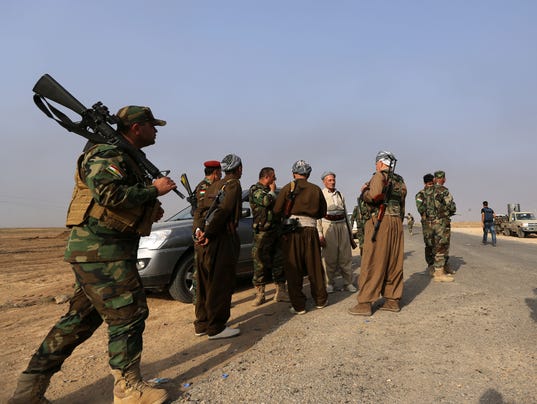Results 1 to 1 of 1
Thread Information
Users Browsing this Thread
There are currently 1 users browsing this thread. (0 members and 1 guests)
-
10-02-2014, 01:00 AM #1
Bombs slam into Islamic State stronghold on Iraq-Syria border
Bombs slam into Islamic State stronghold on Iraq-Syria border
Jonathan Krohn, Special for USA TODAY10:25 p.m. EDT October 1, 2014

(Photo: Hadi Mizban AP)
RABIA, Iraq - Cheers erupted as the bomb dropped.
Whistling rang out here on the Syrian border from the earthen mounds built up by Kurdish peshmerga bulldozers as everyone stared at the billowing smoke, waiting for it to clear so they could assess the damage.
The British Royal Air Force (RAF) had bombed the Islamic State's last position in the Syria-Iraq border town of Rabia: an unfinished hospital where 30 militants are holed up, Alamo-style. Surrounded by 1,500 Kurdish troops, these are the remnants of an alleged 400-man force IS had sent to Rabia.
According to Kurdish fighters, 50 IS members had been killed during the past day of fighting while the rest fled across the border to Syria or moved east towards their stronghold of Mosul. Over the past twenty-four hours, airstrikes from the US-led coalition have given cover to the Kurds as they began a push to retake a swath of land, including Rabia, snaking across the ever-important Northern Iraq-Syria border.
On the ground, however, the airstrike quickly became a source of confusion.
Not long after the dust had quite literally settled on the RAF bombing witnessed by USA Today Wednesday, Colonel Abdel Jaber Jamal, a deputy commander for one of the two infantry divisions deployed to Rabia, and Captain Dilshad Dawud, a scout for airstrike locations, disagreed over the provenance of the strike.
"It was the Americans," insisted Col. Jamal, based on a hunch.
"It was the British," countered Capt. Dawud, going off a rumor.
Neither had spoken directly to anyone from the coalition forces, and neither was quite sure whether what they said was true. Nor could anyone else offer much certainty. Brigadier Hamid Hashim, the lead commander of Col. Jamal's division, for instance, claimed that, not only was this a British strike, but he had been in contact with a pilot who "had a woman's voice."
The building the 30 IS militants are trapped in sits in the center of town, which was rocked by the explosion. Within the next hour, a fire-fight broke out between the peshmerga - which literally means "those who confront death" and is the term used by Kurds to refer to their fighters - and what jihadis who remained in the unfinished hospital complex. Occasionally, the thud of a tank shell can be heard.
As of Wednesday evening, IS was still in control of the hospital.
"They refuse to surrender," says Col. Jamal, "They will shoot, they will fight, or they will die, those are their only options."
Casualties have been quite high during the short 24 hr battle so far. At a peshmerga staging area near the town entrance, armored transports pull in with the injured and dying.
One man is lowered slowly out of the back with his jaw partially blown off. As he walks towards a waiting car, he keeps his left arm pressed up against his chin so as to keep the right side of his mouth in place. He stops to spit up some blood as he's ushered into a car for a fifteen minute ride to a Red Crescent checkpoint, bleeding profusely.
Still on the transport lies a motionless body. By the count of Hashiar Esse, the head of the Red Crescent's Dohuk office, these are just two of about 64 wounded and at least 11 deaths from the fighting in Rabia that he had tallied by late Wednesday afternoon.
This fight is "very important," notes Lieutenant Colonel Sharkar Rashid of the 1stArtillery Division as he watches the chaotic scene of the injured. "It's the border between Syria and Iraq. If the peshmerga doesn't control the towns [along the border] they [IS] will go deep into Iraq again," says one of Lt. Col. Rashid's men, butting into the conversation.
And Rashid's soldier isn't wrong. Known for its history as a smuggling town, Rabia is a key border crossing that has become a major part of IS' supply route between Syria and Iraq. If the peshmerga can finish taking the town, it'll spell some much needed good news for the beleaguered North of Iraq.
How long IS can keep their last bit of Rabia inside the hospital is anyone's guess. "Only God knows. And IS knows," says Brigadier Hashim, with a hearty laugh.
http://www.usatoday.com/story/news/w...newstopstories
NO AMNESTY
Don't reward the criminal actions of millions of illegal aliens by giving them citizenship.
Sign in and post comments here.
Please support our fight against illegal immigration by joining ALIPAC's email alerts here https://eepurl.com/cktGTn
Similar Threads
-
Kurds seize Iraq/Syria border post; Sunni tribe joins fight against Islamic State
By JohnDoe2 in forum Other Topics News and IssuesReplies: 0Last Post: 09-30-2014, 09:07 PM -
Islamic State: France ready to launch Iraq air strikes
By JohnDoe2 in forum Other Topics News and IssuesReplies: 1Last Post: 09-19-2014, 12:01 AM -
CIA: As Many as 31,000 Islamic State Fighters in Iraq, Syria
By JohnDoe2 in forum Other Topics News and IssuesReplies: 0Last Post: 09-11-2014, 09:47 PM -
Obama Deploys Laser Guided Bombs on the Islamic State
By kathyet2 in forum Other Topics News and IssuesReplies: 3Last Post: 08-11-2014, 03:39 PM -
2 rockets slam into Beirut stronghold of Lebanese Hezbollah group, wounding 4
By JohnDoe2 in forum General DiscussionReplies: 1Last Post: 05-26-2013, 06:43 PM


 LinkBack URL
LinkBack URL About LinkBacks
About LinkBacks




 Reply With Quote
Reply With Quote


Oklahoma House passes bill making illegal immigration a state...
04-19-2024, 05:14 AM in illegal immigration News Stories & Reports